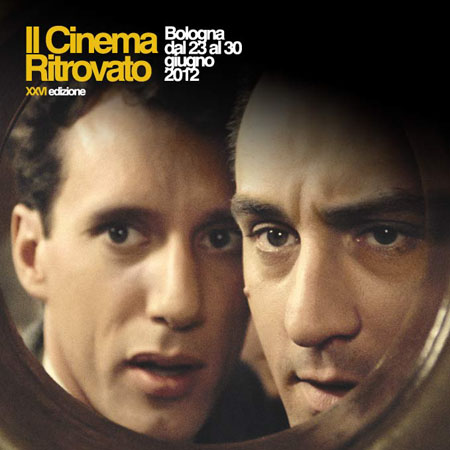This year’s Il Cinema Ritrovato, a festival dedicated to screening restorations and rediscoveries and to celebrating the origins of cinema, opened in Bologna this past Saturday and will run through this coming Saturday. Dave Kehr, who’s had a hand in programming a selection of rarely seen films by Raoul Walsh, calls it “a remarkable event—an opportunity to see some of the latest preservation work from around the world, as well as to pass time with a warm community of journalists, scholars, archivists, distributors and filmmakers.”
Ehsan Khoshbakht, launching coverage at MUBI’s Notebook, notes that this year’s edition, the 26th, “is a mad marathon of 316 films made in the last hundred years or so, most of them in the best available prints in the world. It is the festival which you can smell the nitrate and see the invention of a century through fragmented images.” Among the highlights: “The 1910s oeuvre of the enigmatic, early Hollywood woman filmmaker, Lois Weber, alongside a tribute to Mrs. Hitchcock, Alma Reville, makes it essential to rethink the role of women in the history of cinema, whether as extremely talented director like Weber, or a magician of the editing room like Reville…. One of the greatest pieces of news from Il Cinema Ritrovato is the screening of 12 films made by probably the most underrated director of the French cinema, Jean Grémillon.”
Extensive coverage is coming in from the just-launched Photogénie, a blog edited by several Belgian film scholars and an initiative of VDFC (Flemish Service for Film Culture) with the support of Cinematek (Royal Belgian Film Archive). Tom Paulus calls Grémillon the “first major (re)discovery” of the festival: “Grémillion was never considered a major figure of the French cinema of the thirties on a par with, say, Feyder, Duvivier, Carné, Clair, Renoir and Vigo. If his name rings a bell at all even in cinéphile circles, it is because of the two films he made during the Vichy period, Lumière d’été (1942) and Le ciel est à vous (1943), the first a scathing critique of the ruling classes that was banned for the duration of the occupation… But Grémillon had been an important director for much longer. His La Petite Lise (1930) is one of the most experimental and creative early French sound films, paradoxically enough in the ample use it makes of silence, that can stand next to the early sound masterpieces by René Clair.”
Also at Photogénie, Sam Roggen sums up the highlights of the festival’s first and second days of the Cinephilia Rediscovered panel discussions.
Antti Alanen, film programmer at the National Audiovisual Archive in Finland, has been posting terrific notes on the films he’s been seeing: Shozo Makino’s Chushingura (1912), Teinosuke Kinugasa’s Tsukigata Hanpeita (1925), Fred C. Newmeyer and Sam Taylor’s Why Worry? (1923), Julien Duvivier’s David Golder (1931), a selection of films by Mario Ruspoli, including Les Hommes de la baleine (1956) and Viva la baleine (1972), Jacques Demy’s Lola (1961), and Raoul Walsh’s Distant Drums (1951).
And Meredith Brody‘s filed two dispatches so far to Thompson on Hollywood.
Updates: Sam Roggen at Photogénie on the third day of Cinephilia Rediscovered.
And for those who read German, Lukas Foerster is posting dispatches: Days 1 and 2 and 3.
Updates, 6/29: “The fourth discussion in the Cinephilia Rediscovered series united three cinephile critics,” writes Sam Roggen at Photogénie. And they are “Jonathan Rosenbaum, who published extensively on cinephilia (must-reads are his Goodbye Cinema, Hello Cinephilia and Movie Mutations, co-edited with Adrian Martin), Miguel Marías, former director of the Spanish Film Archive and of the Spanish Film institute ICAA, and Girish Shambu, probably today’s most influential blogger on cinema, and co-editor (also with Martin) of the wonderful online film journal LOLA (of which the second issue was released two weeks ago).” Not only has he posted the video of the session (58’59”), he’s also interviewed Jonathan Rosenbaum.
“Olaf Möller is a hard-to-miss cinephile who dresses in black (but his beard distinguished him from Johnny Cash),” writes Ehsan Khoshbakht in his second dispatch to MUBI’s Notebook, “and when he talks about Mosfilm director, Ivan Pyr’ev whose retrospective Möller curated, it looks as if he discovered Solomon’s mines.”
And there’s more from Meredith Brody on days 3 and 4.
Updates, 7/1: Jonathan Rosenbaum, a jury member along with Lorenzo Codelli, Alexander Horwath, Mark McElhatten, and Paolo Mereghetti, has the winners of the Il Cinema Ritrovato DVD Awards 2012.
Lukas Foerster presents his rankings for this year’s edition.
Sam Roggen on the fifth round of Cinephilia Rediscovered: “With Olaf Möller, Christoph Huber and Gabe Klinger, Roy Menarini, curator of the Cinephilia Rediscovered series, invited three of the enfants terribles of this new wave of critics… This threesome is somewhat notorious for their fundamental views on a number of hot topics, which often results in polemical and vibrant debates (their session in Bologna was certainly the most animated in the series).” And he’s got the video of the session (59’16”).
Also at Photogénie, Tom Paulus on Raoul Walsh; and on Summer Light (Lumière d’Eté, 1942), “a gaping hole of darkness, by far the bleakest film of its director, Jean Grémillon.”
And Meredith Brody presents Day Five in her diary for Thompson on Hollywood.
Updates, 7/5: Video’s up from the last two sessions of the Cinema Rediscovered discussions. Bart Versteirt‘s got Serge Toubiana of La Cinémathèque française and Jean Gili of Éditions Larousse’s Dictionnaire Mondial du Cinéma and David Chute‘s got Henry Jenkins and Dave Kehr.
From Ehsan Khoshbakht‘s third dispatch to MUBI’s Notebook: “I can profoundly feel the endlessness of the medium. Though this is supposedly a journey through the past, as Henri Langlois points out, it also indicates our very future. In this regard, at least to me, Raoul Walsh is the future and cinephilia is nothing but shaping our future by returning to the rich heritage of the moving images.”
Updates, 7/6: “For me, as a moviegoer, the main excitement of this year’s program involved rediscovering an American filmmaker I thought I already knew.” For the Film Society of Lincoln Center, Larry Gross is writing, of course, of Raoul Walsh.
And in MUBI’s Notebook, Ehsan Khoshbakht posts a final roundup of the highlights of this year’s edition.
Update, 7/8: “Pyriev is an interesting case historically,” writes Kristin Thompson in just one section of her overview of this year’s edition. “He came to filmmaking just as the Soviet Montage movement of the 1920s was coming under official pressure for its formal complexity…. Overall, I like these films a little better than those of his more famous colleague in the creation of buoyant musicals, Grigori Alexandrov. Yet it has to be mentioned that there is a certain underlying unease in being entertained by films that created hugely idealized images of life on collective farms.”
Update, 7/11: “My first visit to Il Cinema Ritrovato in Bologna turned to be a total film festival experience, more so than any other I’ve experienced,” blogs Girish Shambu. “I travel annually to Toronto’s TIFF, and have attended festivals in cities like Rotterdam and Montreal but never before was I so strongly engaged with exploring the city itself, its streets and architecture, its restaurants, and witnessing its cultural life.” And he briefly reviews “a half-dozen festival highlights.”
Update, 7/12: “The scope and diversity of the program is astonishing,” writes Dave Filipi, director of Film/Video at the Wexner Center for the Arts. “At a traditional festival, it’s often easy to write off one film in favor of another when figuring out one’s screening schedule. Not here. I wanted to see EVERYTHING. Even if it was something I’d seen before, such as Jacques Demy’s Lola, Rossellini’s Voyage to Italy, or Lawrence of Arabia, it was being shown in a recent restoration in Bologna.”
Update, 7/16: Jay Weissberg for the London Review of Books on the section featuring 100-year-old films: “89 movies from 1912 were projected, with scattered additions from just before and just after. No other initiative has so vigorously forced scholars and archivists to rethink cinema’s first years; words like ‘primitive’ or ‘static’ have had to be discarded in the face of the breadth and invention of the films shown in Bologna…. Overhanging all, especially the actualities, is the not-so-distant war: it’s impossible to watch throngs of eager-faced, anonymous boys and not imagine their future in the trenches just two years later.”
For news and tips throughout the day every day, follow @KeyframeDaily on Twitter and/or the RSS feed. Get Keyframe Daily in your inbox by signing in at fandor.com/daily.





